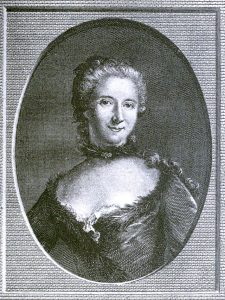 Deadline: October 10, 2025
Deadline: October 10, 2025
Submissions are invited on the writings of women in the 18th and 19th centuries pertaining to physics. The topic should be construed broadly to include: any genre in which the women were writing; “physics” as understood then and/or now; both experimental and theoretical physics; and physics in relation to other areas of inquiry. For example, such writings may engage with concepts, theories, practices, foundations, or methods; with the nature and scope of physics itself; or with philosophy of science more generally, as it applies to physics. Figures of interest include Laura Bassi, Emilie Du Châtelet, Sophie Germain, Caroline Herschel, Jane Marcet, Maria Mitchell, Christina Roccati, Mary Somerville, and Victoria Welby among others, and we welcome submissions that bring to light women who are perhaps less familiar in the history and philosophy of physics. Submissions may engage with the work of a single figure or multiple figures.
The winner will receive $1000 and an invitation to have their paper considered for publication in Studies in History and Philosophy of Science. The prize is open to graduate students and to scholars within 5 years of PhD as of the submission deadline. Submissions should not exceed 10,000 words.
The deadline for submissions is October 1, 2025 (midnight GMT). For more details of the prize and of submission requirements, see below.
The Du Châtelet Prize in Philosophy of Physics is supported by Duke University and Studies in History and Philosophy of Science.
Committee
The members of this year’s prize committee are:
- Joshua Eisenthal. Research Assistant Professor of Philosophy, California Institute of Technology and Editor at the Einstein Papers Project; from September 1, Assistant Professor of Philosophy at the University of Washington; and 2020 Du Châtelet Prize winner
- Samuel C. Fletcher. Professor of Philosophy of Physics, University of Oxford; Tutor in Philosophy, Merton College, Oxford; Resident Fellow, Minnesota Center for Philosophy of Science; External Fellow, Munich Center for Mathematical Philosophy
- Marcy Lascano. Professor of Philosophy, University of Kansas
- Andrew Janiak. Professor of Philosophy, Duke University
- Emily Thomas. Professor of Philosphy, Durham University
- Jennifer Whyte. Postdoctoral Associate in Philosophy, Duke University
Submission requirements
- Submissions must be in English
- Submissions must be prepared for blind review
- Submissions must be no longer than 10,000 words in length, including footnotes and references
- Submitted work must be unpublished and must not be under consideration for publication
The submission portal can be found here: https://www.duchateletprize.org. If you have questions, please contact Katherine Brading (katherine.brading@duke.edu).
More information about the prize
The Du Châtelet Prize in Philosophy of Physics celebrates excellence in philosophy of physics and promotes breadth across the field both historically and philosophically. Each year, a prize committee of scholars in the field invites submissions on a particular topic. The prize winner receives feedback and support from the committee, and the paper is considered for publication in Studies. The goals of the prize are to support young scholars working in philosophy of physics, to strengthen the historical and philosophical breadth of the field, and to promote some of the very best work being done by students and junior scholars.
Submissions are considered under blind review. Should a possible conflict of interest be recognized, committee members are recused accordingly.
2024: no prize awarded
2023 Winner: Marta Bielinska and Caspar Jacobs “A Philosophical Introduction to Hidden Symmetries in Physics”
Topic: Laws and symmetries in the practice of physics
Committee: Elena Castellani, Nina Emery, Bas van Fraassen, Marc Lange, with input from Nancy Cartwright
2022 Winner: Ovidiu Babeș “Mixed Mathematics and Metaphysical Physics: Descartes and the Mechanics of the Flow of Water”
Topic: Descartes’s Metaphysical Physics
Committee: Roger Ariew, Dan Garber, Dana Jalobeanu, Alison Peterman, and Sophie Roux
2021 Winners: Jamee Elder “The ‘Direct Detection’ of Gravitational Waves”, Studies in History and Philosophy of Science 110 1-12, 2025, and Miguel Ohnesorge “Pluralizing Measurement: Physical Geodesy’s Measurement Problem and its Resolution”, Studies in History and Philosophy of Science 96 51-67, 2022.
Topic: Measurement practices in the physical sciences: correlation, calibration and stabilization
Committee: Alisa Bokulich, Hasok Chang, Daniel Mitchell, and Wendy Parker
2020 Winner: Joshua Eisenthal “Hertz’s Mechanics and a unitary notion of force”, Studies in History and Philosophy of Science Part A 90 226-234, 2021.
Topic: Mathematics as a tool of conceptual innovation in physical theory and/or experiment, 1780-1890.
Committee: Katherine Brading, Janet Folina, Doreen Fraser, Lydia Patton and Sheldon Smith
2019 Winner: Adwait Parker “Newton on Active and Passive Quantities of Matter”, Studies in History and Philosophy of Science Part A 84 1-11, 2020.
Topic: How the parts of matter act on one another, as that issue stood at any time in the period 1680-1780
Committee: Katherine Brading, Mary Domski, Andrew
You cannot copy content of this page








